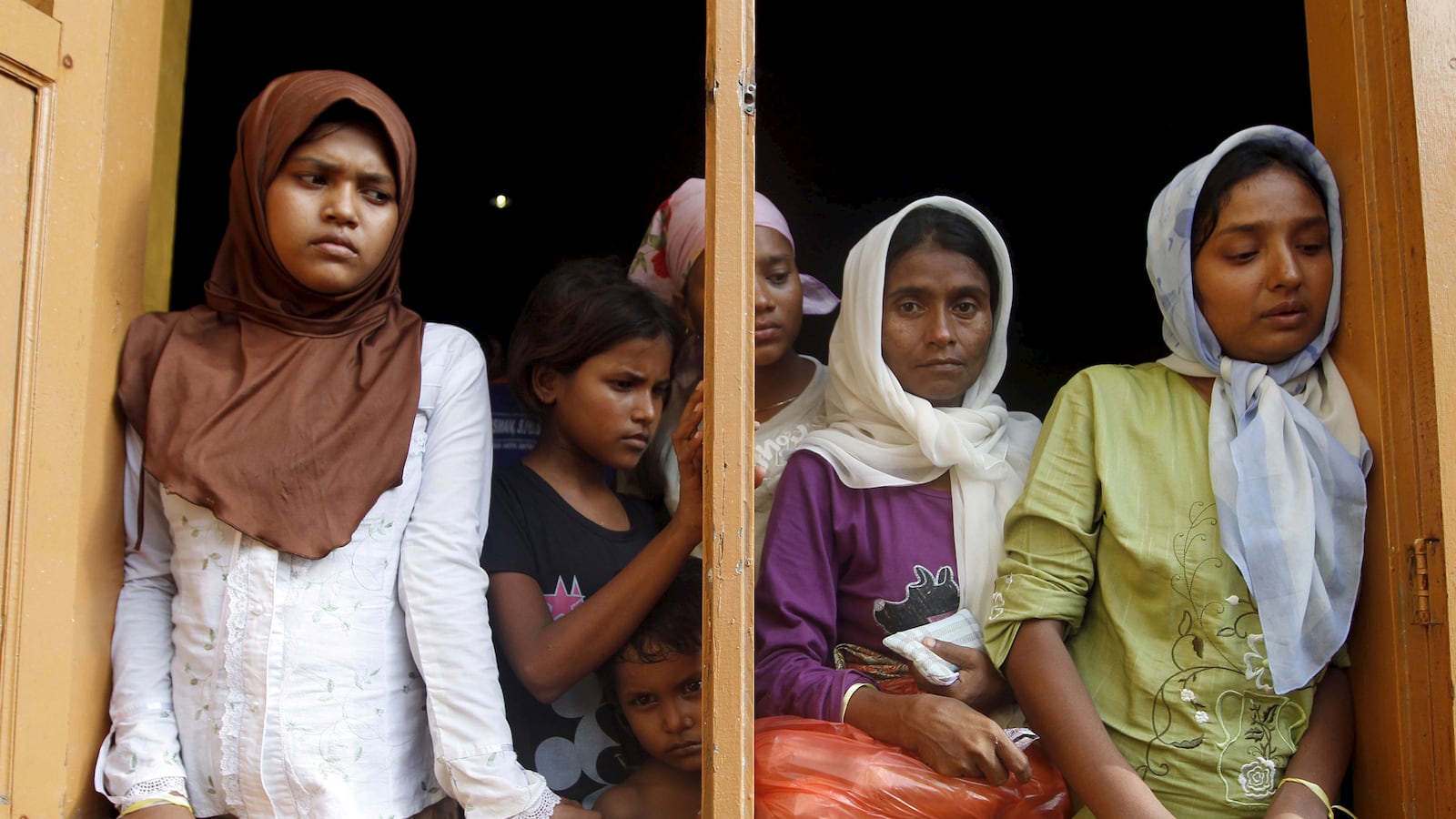BANGKOK—As boatloads of stateless Rohingya people and other migrants drift off the coasts of Thailand, Indonesia and Malaysia, the ruling junta in Bangkok has called for a regional meeting to discuss controlling the crisis. That sounds as if the Thais and others are finally ready to resolve the looming humanitarian disaster. Then again, maybe not.
Prime Minister Prayuth Chan-ocha, the general who led the coup d’état that toppled Thailand’s democratically elected government a year ago, has set the meeting for May 29. That might as well be a year from now, and could be a death sentence for many of the more than 8,000 boat people seeking to land somewhere—anywhere—as they struggle with a lack food, potable water, and with disease.
The May 29 meeting is to be attended by representatives of some 15 different entities, including Cambodia, Laos, Vietnam, Australia, the United States—which has called for cooperation to address the migrants’ plight—the United Nations High Commissioner for Refugees, and the International Organization for Migration (IOM), in addition to Thailand, Indonesia, Malaysia and Burma, also known as Myanmar. But critics say two weeks is far too long to wait.
“You can’t have these people float around until they die,” Phil Robertson of Human Rights Watch tells The Daily Beast. “At this pace that could be a close-the-casket kind of meeting.”
The problem is that none of the affected nations—Thailand, Malaysia, Indonesia, Burma—has much incentive or desire to help the Rohingyas, or the other migrants who are believed to be from Bangladesh.
Burma, allegedly democratizing and “opening up” the country, is still controlled by a military regime that has been fighting long-running insurgencies in several states—from Kachin to Rakhine to Shan, not to mention the protracted conflict with the Karen people. The generals—and many ordinary citizens in the largely Buddhist nation—regard the mostly Muslim Rohingyas as stateless squatters who are to be locked up or expelled.
Burma’s harsh treatment of the Rohingyas is the root of the problem, but Indonesia, Thailand and Malaysia have little appetite for absorbing thousands of refugees who might upset delicate balances at home and anger populations that see the migrants as interlopers likely to put pressure on state resources and take jobs away from locals.
“We don’t want them to come here,” Wan Junaidi Tuanku Jaafar, Malaysia’s deputy home minister, said on Wednesday. Malaysia had been quietly accepting new Rohingya migrants, but the minister said the country will adopt tough measures, including turning back boats and deporting people in a bid to send the “right message.”
Analyst Kan Yuenyong tells The Daily Beast that Thailand’s “elite class” already has to deal with restive, Muslim-leaning southern provinces (Pattani, Narathiwat, Yala and Songkla) for which it has no adequate development or integration plan. The Rohingyas “could create some turbulence in society, and it’s not easy for Thailand to absorb these Muslim people,” says Kan, director of the Siam Intelligence Unit think tank.
Indonesia’s navy has turned away boats—one vessel reportedly contained 400 people—that reached the country’s shores. Officials gave migrants food and supplies—and directions to Malaysia. The Indonesian government, which has been highly critical of Australia’s “inhuman” decision to cut its intake of asylum seekers, apparently sees no hypocrisy in its own anti-refugee stance.
Thailand, meanwhile, has opted to go after the human traffickers who profiteer from the Rohingyas’ and Bangladeshis’ misery, smuggling hundreds into the kingdom. The move follows the discovery in Thailand of mass graves in so-called slave camps where migrants were held. On Tuesday, Thai officials discovered another such abandoned camp—the largest of five sites found in a sweep launched at the beginning of May. The camp featured 21 sleeping sheds, eight latrines and two watchtowers.
The Thai crackdown on what Robertson calls “ransom-for-release camps,” in turn, prompted smugglers to abandon many migrants, leaving them adrift in boats that sometimes have no captains or crews and may or may not be seaworthy, “essentially floating to nowhere.”
The Arakan Project, a Rohingya advocacy group, reports that it spoke via telephone with passengers aboard one vessel carrying 350 people, who said they were abandoned by their Thai smugglers. "They told us they have had no food and water for the last three days,” according to the group’s founder, Chris Lewa.
Robertson, the Human Rights Watch deputy director for Asia, concedes that Thailand deserves credit for calling the meeting, but says the country and its neighbors must realize they can’t simply transfer Rohingyas to other jurisdictions and treat people as if they are just “passing the trash.”
“They need to end this pushback policy and work together,” he tells The Daily Beast. “They need to realize they have 5,000 to 10,000 people who need to be allowed humanitarian aid. They have to end this ‘beggar thy neighbor’ approach.”
The United Nations this week appealed for a rapid-rescue operation to avoid a humanitarian crisis. About 2,000 migrants, both Burmese Rohingyas and Bangladeshis, were rescued off the Indonesian and Malaysian coasts earlier this week.
Human Rights Watch and others say Thailand, Indonesia and Malaysia must give UNHCR and the IOM access to migrants, provide humanitarian aid, permit migrants to claim refugee status if they so wish, and eventually devise a plan, to quote Robertson, “to have a regional agreement on how to proceed once they have them [migrants] stabilized.”
The Southeast Asian neighbors, however, will need to act with greater urgency to avoid possible calamity. According to the U.N., some 40,000 Rohingyas are in camps in Burma—where anti-Rohingya violence has driven some 140,000 people from their homes over the last three years. In just the first quarter of this year 25,000 people reportedly have been forced to flee their homes in Burma and Bangladesh.
“Burma has been solving this problem one boatload at a time,” Robertson says. That’s not exactly a recipe for a long-term solution.






